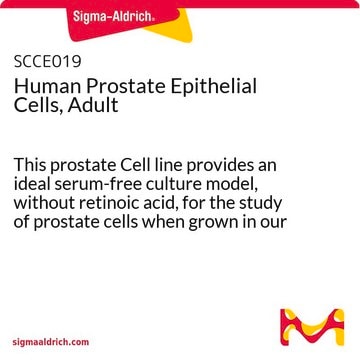SCC118
CWR-R1ca Human Prostate Cancer Cell Line
Human
Synonyme(s) :
Fibroblast-Free CWR-R1 cell line
About This Item
Produits recommandés
product name
CWR-R1ca Human Prostate Cancer Cell Line, CWR-R1ca Human Prostate Cancer Cell Line is a valuable cell model for castration-recurrent prostate cancer studies.
Source biologique
human
Niveau de qualité
Conditions d'expédition
ambient
Description générale
Key Applications:
• Androgen Receptor Splice Variant 7 (AR-V7) studies
• Anti-androgen therapy
• In vivo tumorigenesis
CWR-R1ca was derived from the castration-resistant or recurrent CWR-R1 human prostate cancer cell line . The original parental CWR-R1 is a human prostate carcinoma epithelial cell line derived from the recurrent CWR22 human xenograft tumors that were harvested from nude mice 140-160 days after castration and express AR full length (AR-FL), AR-V7 and PSA mRNA and protein .
Description de la lignée cellulaire
Application
Cancer
Oncology
Qualité
• Cells are tested by PCR and are negative for HPV-16, HPV-18, Hepatitis A, B, C and HIV-1 & 2 viruses.
• Cells are negative for mycoplasma contamination.
• Each lot of cells are genotyped by STR analysis to verify the unique identity of the cell line.
Stockage et stabilité
Clause de non-responsabilité
Code de la classe de stockage
12 - Non Combustible Liquids
Classe de danger pour l'eau (WGK)
WGK 1
Point d'éclair (°F)
Not applicable
Point d'éclair (°C)
Not applicable
Certificats d'analyse (COA)
Recherchez un Certificats d'analyse (COA) en saisissant le numéro de lot du produit. Les numéros de lot figurent sur l'étiquette du produit après les mots "Lot" ou "Batch".
Déjà en possession de ce produit ?
Retrouvez la documentation relative aux produits que vous avez récemment achetés dans la Bibliothèque de documents.
Notre équipe de scientifiques dispose d'une expérience dans tous les secteurs de la recherche, notamment en sciences de la vie, science des matériaux, synthèse chimique, chromatographie, analyse et dans de nombreux autres domaines..
Contacter notre Service technique




